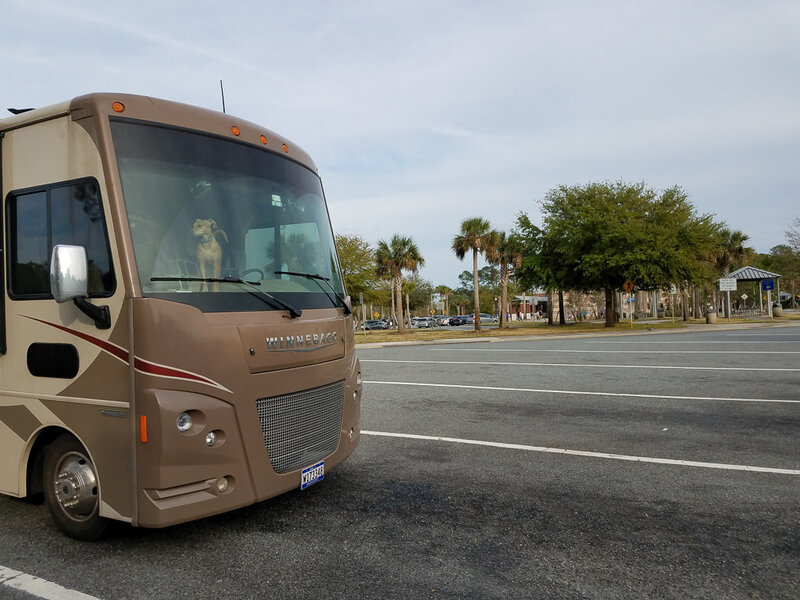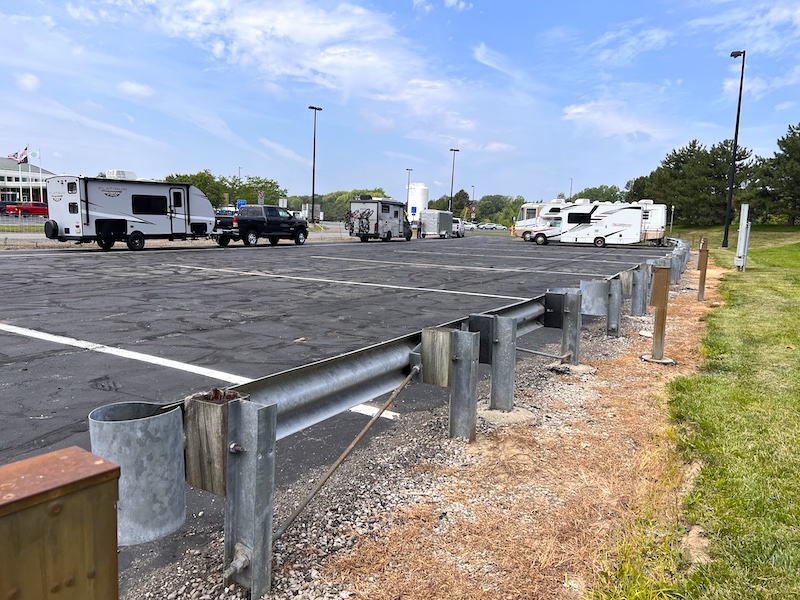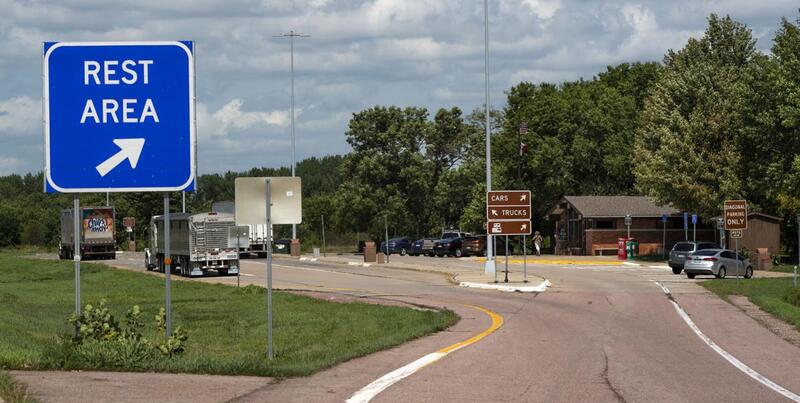Thanks for your support! If you make a purchase using our links in this article, we may make a commission. And, as an Amazon Associate, I earn from qualifying purchases. See the full disclosure here.
Updated April 8, 2024
There are many conflicting laws regarding overnight rest area rules that keep many full-time RVers in a state of confusion. Because of rapidly shrinking overnight parking lot options, RVers choose to overnight in rest areas when they have no other options available.
Every U.S. state has different regulations when it comes to staying overnight in rest areas. Some states have one set of rules for their turnpike rest areas and another set for their public highway system.
Our discussion will bring clarity to those vague rest stop signs and show you what the actual rules are for staying overnight in rest areas in various U.S. states. Driving tired is dangerous, so here’s what you need to know about highway rest stops.
A Stressful Scenario Overnighting in a Rest Area

After driving their motorhome for over six hours, our friends Bob and Belinda were ready to call it a day. They pulled into a Super Walmart parking lot only to discover a huge “NO OVERNIGHT RV PARKING” sign. They had no choice but to get back on the road.
“Look, there’s a sign for a rest stop,” Belinda said, pointing straight ahead. “Let’s try that.”
But as soon as they entered the rest area, another dreaded sign greeted them with a No Overnight Parking warning.
“What do we do now?” Bob asked. “We need to stay overnight somewhere!”
They debated for a while, but in the end, they took a chance and stayed overnight in the rest area. They were nervous as they settled into their RV.
Bob tossed and turned, worried they were breaking the law. He expected someone to bang on the door at any moment. They hit the road at first light, scurrying away as if they had committed a crime.
Unfortunately, Bob and Belinda’s overnight stay turned into a stressful experience. When it should have been a time for relaxation, they were nervous and upset—all because they didn’t understand the rest area’s interpretation of “Overnight Parking.”
It’s a common mistake, a mistake you’ll never make after reading this article.
Which States Allow Overnight Parking at Rest Areas?
The good news is no matter what state you’re traveling in; all rest areas allow you to pull in and rest.
The challenge, however, is knowing how long you can stay. Sometimes rest areas post the time limits, but many don’t. This article clears the confusion so you can pull into a rest area with confidence.
Am I Parking Overnight or Camping in the Rest Area?
When you see signs that say “no camping” or “no overnight parking,” they are referring to the legal definitions. When you pull in with your RV and stay inside, are you parking overnight or camping in the rest area? The answer to this question is neither.
Parking Versus Standing

Legally, you are parking when you pull any vehicle into a parking space and leave it unoccupied.
But when you stop and stay inside your RV, you are “standing,” not parking.
The “No Overnight Parking” signs warn those who physically leave their vehicle to sit overnight.
Imagine pulling into a rest stop, and it’s full of “parked” vehicles where the drivers are nowhere in sight.
A rest area security guard in Alabama explained to an RV couple:
The “No Overnight Parking” sign keeps people from using the rest area as a car-pool parking lot and physically leaving their vehicles here.
When you roll into a rest stop and see a “No Overnight Parking” sign, it doesn’t mean you’re prohibited from sleeping during the night.
What is Camping in a Rest Area?

You are also not camping in a rest area, even though many RVers refer to full-time RVing as camping.
Camping is what you would expect—pitching a tent and building a campfire. However, sleeping in your RV does not mean you’re camping.
Georgia’s Department of Transportation provides an excellent description of camping as:
… temporary habitation outdoors as evidenced by one or more of the following actions: the erection or use of tents or other shelters; the laying down of sleeping bags, blankets, or other materials used for bedding; the placing or storing of personal belongings; the making of a fire; or the act of cooking.
To avoid the appearance of camping, you should not:
- Place chairs, rugs, or any other item outside the RV.
- Extend your slides.
- Play loud music or television.
- Sleep outside the RV.
- Open your awning.
The table below shows which states allow RVers to sleep overnight in rest areas. This can include turnpikes, freeways, or both. For specific details, check with the specific state’s Department of Transportation.
| State | No | Yes |
| Alabama | Y | |
| Alaska | Y | |
| Arizona | Y | |
| Arkansas | Y | |
| California | Y | |
| Colorado | N | |
| Connecticut | Y | |
| Delaware | Y | |
| Florida | Y | |
| Georgia | Y | |
| Hawaii | N | |
| Idaho | Y | |
| Illinois | Y | |
| Indiana | Y | |
| Iowa | Y | |
| Kansas | Y | |
| Kentucky | Y | |
| Louisiana | Y | |
| Maine | Y | |
| Maryland | N | |
| Massachusetts | Y | |
| Michigan | Y | |
| Minnesota | Y | |
| Mississippi | Y | |
| Missouri | Y |
| State | No | Yes |
| Montana | Y | |
| Nebraska | N | |
| Nevada | Y | |
| New Hampshire | Y | |
| New Jersey | Y | |
| New Mexico | Y | |
| New York | Y | |
| North Carolina | N | |
| North Dakota | Y | |
| Ohio | Y | |
| Oklahoma | Y | |
| Oregon | Y | |
| Pennsylvania | Y | |
| Rhode Island | Y | |
| South Carolina | N | |
| South Dakota | Y | |
| Tennessee | N | |
| Texas | Y | |
| Utah | Y | |
| Vermont | Y | |
| Virginia | N | |
| Washington | Y | |
| West Virginia | Y | |
| Wisconsin | Y | |
| Wyoming | Y |
- Georgia only prohibits overnighting in the rest area at the welcome center locations.
- Hawaii doesn’t have rest areas, but they ban sleeping in a vehicle on the side of the road.
- Indiana allows overnights in a rest area unless posted otherwise.
- New Jersey allows overnighting in rest areas for RVers, but some turn commercial vehicles away.
Defining What is Necessary for Comfort and Rest?
The U.S. Department of Transportation Federal Highway Administration defines a safe rest area as:
… a roadside facility safely removed from the traveled way with parking and such facilities for the motorist deemed necessary for his rest, relaxation, comfort, and information needs.
But here’s the problem. Not all states allow motorists to “deem what is necessary” for their rest and comfort. The time you have to stay in rest areas varies from state to state. Some states allow you to sleep undisturbed in rest areas.
In contrast, others mandate the highway patrol knock on your door and force you to move along if they notice you exceed the time limit. So you must know the allotted parking limits for each state’s rest areas.
What Are the Time Limits for Parking at Rest Areas in Each State?
Every state has different time limits on how long you can stay. Some don’t have limits, but that doesn’t mean you can pull out the outside furniture for a weekend RV trip. Here are some examples:
Alabama
The Alabama Department of Transportation (ALDOT) does not have specific parking rules for rest areas, so you can stay as long as you need to.
And if you’re looking to learn more about Alabama’s trees, you’re in luck. The state has a new tree identification program within its twenty-seven rest stops.
Alaska
The Alaska Administration Code regarding rest stops and pullouts states:
A person may not park a vehicle or camp for longer than the posted limits in a highway rest stop or pullout located on the state highway system.
Because rest areas in Alaska are few and far between, with desolated stretches of highway between them, many RVers simply pull off the road and rest when needed.
Arizona
The Arizona Department of Transportation’s website outlines the rules for its rest areas.
Arkansas
Arkansas is one state that allows overnight parking in rest areas, but for safety reasons only.
California
In California, you can stay at a rest area for eight hours within any 24 hours.
The Department of Transportation (Caltrans) website regarding safety roadside rest areas states:
Rest areas are an important part of Caltrans’ efforts to ensure traveler safety. They provide clean, safe, and comfortable places for travelers to rest and manage their needs. Attractive and useful, rest areas encourage travelers to use a safe location off the roadway to take a break and return more alert to the highway.
Delaware
Delaware has one Service Center on I-95 with unlimited time to rest and one rest area on Route 13, North of Smyrna, limiting RV stays to eight hours.
Florida
The Florida Department of Transportation (FDOT) states:
Overnight camping is not permitted, but visitors may stay for up to three hours.
Idaho
In the Potato State, you can stay ten consecutive hours at interstate rest areas, whereas rest areas on state highways allow for sixteen hours.
Kansas
Kansas rest areas are a special treat for RVers. You can stay for a full 24 hours, and many of them have a loop specifically designed for RVs.
Mississippi
The Mississippi Department of Transportation states on its Guidelines for Rest Areas and Welcome Centers website that:
Long-term parking at highway rest areas is not allowed…Long-term would be considered as vehicles parked at a rest area for more than an 8-hour continuous period, occupied or not. If a vehicle is parked at a roadside facility for more than this time period, it may be removed either by MDOT forces or the Mississippi Highway Patrol.
Oregon
12 hours within any 24 hours. Oregon is one of the few states with comprehensive, clear-cut rest areas rules:
Setting up a tent or other structure, camping, or remaining in a rest area for more than 12 hours within any 24 hours.
Pennsylvania
Pennsylvania’s rules for rest areas are a bit confusing. The state allows only two hours in rest areas on the highway system. Yet, they allow 24 hours at service plazas on the Pennsylvania Turnpike.
Can I Sleep in My RV at a Rest Area?
Another common question many RVers have is if it’s legal to sleep in your RV at a rest area. Yes, you can sleep in your RV in a rest area, even if there are signs for “No Overnight Parking’” as explained above.
Just be sure to leave before your time limit expires. If you’re ever feeling drowsy and in need of a break, don’t be afraid to pull into the next rest area.
As long as you’re considerate of your fellow travelers, you should be able to sleep as long as it takes for you to feel ready to get back on the road.
Is Sleeping at Rest Stops Safe?
Sleeping at rest stops is safe if you take common-sense precautions. Most rest stops are well-lit and have security cameras, so you should feel comfortable resting overnight in rest areas.
Unfortunately, single women RVers must take extra precautions when overnighting in rest areas, as they are more likely to be targeted by criminals. But as long as you’re aware of your surroundings and take the necessary precautions, sleeping at a rest stop can be a safe and convenient way to get some much-needed shut-eye.
Overnight rest areas sometimes have truckers and other RVs in the lot so at least there is some comfort knowing others are nearby.
Rest Area Safety Tips
When you’re on the road, rest areas can be a lifesaver. They provide a place to stop and rest, use the restroom, and grab a bite to eat. However, it’s essential to keep safety in mind when using them. Like a good Boy or Girl Scout, always be alert and prepared.
- Sleep in your clothes for quick departure if needed.
- Travel with a dog.
- Keep your mobile device charged at all times.
- Don’t open your door to anyone. If the visitor says they are the police or other official, ask them to step to the window and have them use a flashlight so you can see their credentials.
- Scan the area before stepping out of your RV.
- Watch for suspicious activity. If you see anything that makes you uncomfortable, leave the area immediately and report it to the police.
- Stay overnight only if necessary.
- Note the rest area’s name or the nearest mile marker if there’s an emergency.
What Amenities Do Rest Areas Have?
The amenities offered in rest areas can vary, but most rest areas have basic services, such as toilets and vending machines. Some larger rest areas may extend amenities to free Wi-Fi, dump stations, pet areas, and travel information.
Many states have enhanced rest areas, creating pleasant experiences for weary travelers.
For example, the Texas Department of Transportation (TxDOT) is constructing new rest areas incorporating interpretive trails, tornado shelters, play areas, and exhibits.
When you stop at Tamarack Tourist Information Center in the Appalachian region of West Virginia, don’t be surprised to hear live music, see local artists selling their crafts and a farmer’s market.
And if you want to visit the rest area with the best view in the country, stop at Bear Lake Rest Area and Overlook on Route 89 in Utah.
This scenic overlook provides a perfect place to take in the incredible view of Bear Lake and the surrounding mountains.
Since Utah is one of the states that doesn’t limit your time, you can stretch your legs and enjoy a picnic lunch for as long as you like.
7 Tools for Finding Rest Areas
There are a few ways to locate rest areas on the road. Whether you enjoy published books, hardcopy atlases, free apps, or premium multi-device software suites, you’ll find one that suits your needs.
The following are a few of the most popular options:
1. Allstays Rest Stop Plus
Allstays Rest Stop Plus gives users a way to filter rest stops down to the amenities they need. The icons on the map show people in which direction the rest area is accessible and other specific information.
2. Boondockers Welcome
Boondockers Welcome is a great alternative to overnighting in rest areas. Host families let you stay on their property free of charge when you’re a member of the network. Now that they’ve merged with Harvest Host, keep an eye out for upcoming membership plans where you can take advantage of both networks.
3. The Dyrt Pro
The Dyrt Pro is a great trip planning app that helps you find campgrounds, BLM public land, and rest areas. The app also has an offline feature that you can use in data dead zones. As long as you have battery power in your mobile device, you’ll always know how to find a place to rest.
4. Harvest Hosts
Harvest Hosts is just like its counterpart Boondockers Welcome, but you get to stay at breweries, farms, museums, golf courses, wineries, and other places for a night. Overnighting in rest areas and lot-docking in parking lots can save money as you journey to your vacation destination, but staying at a place that offers great food, drinks, and meeting great people can liven up the journey part of the trip.
5. The Next Exit
The Next Exit guide has been around for over 30 years. You can purchase the annually updated hardcopy book or subscribe to the app. Even before mobile technology, RVers considered this guide their “Road Bible” when it first came out in the Classic Era (1971-1989). Even if you love your apps, keeping this hardcopy book with you as an offline backup should be in your RV emergency survival kit.
6. RV Life Trip Wizard
RV Life Trip Wizard, formally known as RV Trip Wizard, you’ll find campgrounds, reviews, food, shopping, rest areas, attractions, and much more through this 3-in-one app. Members also get the Maintain My RV app that tracks all maintenance and repair work completed on your motorhome or travel trailer.
7. TOGO RV
Roadtrippers, which used to be TOGO RV – One of the many apps within Roadtrippers’s suite of apps includes Overnight RV Parking. The app helps you find all of the rest stops on your route and learn the amenities they offer. Now that ToGo owns Campendium, users on both apps can enjoy many of the features each offers.
Can RVers Sleep At Truck Stops?
If you happen to be traveling through a state that does not allow overnight stays at rest stops, you may need an alternative. Knowing where RV parks and campgrounds are located along your route is always a good idea, but things happen. If you are unable to find a campground or RV park, a possible alternative is truck stops.
Most truck stops can accommodate RVs overnight, and many even offer RV-designated
parking. You will need to keep some things in mind when considering an overnight at a truck stop.
First, while many truck stops offer space for RVs, they may charge a fee for things like using their dump station or connecting to power or water. Typically these fees are reasonable, but you will want to make sure you know what is available before pulling into a spot.
Second, not all truck stops have designated spots for RVs. This means that you will be parking among the semis. Many truck drivers are not excited about sharing the space with RVs. Unless there is no other space, try to stay on the automobile side. This leaves the truck parking for professional drivers who really need a place to park and sleep.
Finally, do not be surprised to find truck stops that do not allow RVs. If you are considering a particular truck stop as a stopping point, call ahead to confirm that they have space for RVs. If they do not, it is wise to have a backup plan.
Do RVers Have To Keep A Log Book Like Truckers?
Privately owned, non-commercial motorcoaches and RVs are not required to keep a logbook. Commercial truck drivers are limited to the number of hours that they can drive before having rest breaks or sleeping.
These requirements are intended to prevent accidents and to keep everyone on the road safe. However, it is a good practice to moderate the number of hours that you drive at one time.
Take time to rest when you are traveling between locations. This will keep you sharp
and alert, and more able to react appropriately to the normal hazards of the road.
It’s Safer to Overnight in Rest Areas Instead of Driving Tired
Ultimately, it’s safer to stay overnight in rest areas rather than drive tired. However, knowing the state’s rest area time limits and amenities is important to ensure an enjoyable stay.
Various tools and resources are available to help you find the perfect rest area for your needs. So the next time you pull into a rest area, you can feel confident because you now know the rules of the road.
Final Words About Overnight Rest Areas
Rest stops are a handy feature of the highway system. They offer a safe, designated place for drivers, RVers, and truck drivers to pull off the road, stretch, and rest for a bit.
In some states, rest stops are designed for RVs, trucks, and cars to overnight. Other states do not make these accommodations.
Sometimes it is necessary to pull over and sleep before you reach your destination. Using a rest stop that does not allow overnight stays can result in a ticket or fine. As you plan your travel route, an important bit of information to research is which states allow you to overnight at rest stops, just in case.
It is also a good idea to have alternate stopping places if rest areas are full or prohibit overnighting. Overnight rest areas are great, however, if you can’t make it to one or they are full you want to have a plan B!
Related Reading:
– FREE RV Parking Overnight At Walmart (Rules & Safety)
– Best RV Clubs, Groups & Forums for Single Women
– Is RV and Travel Trailer Theft Common?
– 8 Best RV Discount Clubs to Save Money
Mike Scarpignato – Bio
Mike Scarpignato created RVBlogger.com over five years ago in 2018 to share all we have learned about RV camping.
Mike is an avid outdoorsman with decades of experience tent camping and traveling in his 2008 Gulf Stream Conquest Class C RV and 2021 Thor Challenger Class A motorhome.
We attend RV Shows and visit RV dealerships all across the country to tour and review drivable motorhomes and towable trailers to provide the best evaluations of these RVs in our blog articles and YouTube videos.
We are 3/4-time RVers who created RVBlogger.com to provide helpful information about all kinds of RVs and related products, gear, camping memberships, tips, hacks and advice.



Freecampsites.net is another great resource.
Hi Lisa,
Thanks for that info…I haven’t tried that app…
Mike
This has to be one of the best and most complete articles I’ve seen on this or any other RV subject. Keep up the good work!
Hi Mike!
Thanks so much! Glad you like the article!
Mike